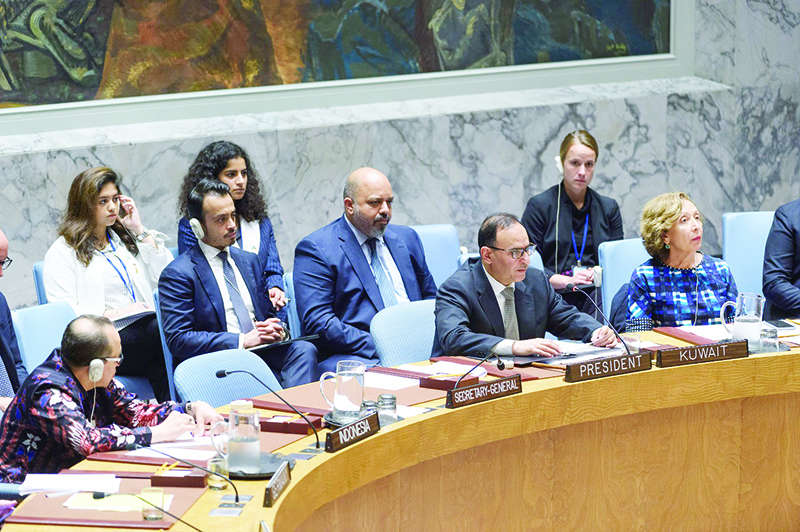
NEW YORK: Kuwait
on Friday called for the immediate halt of Israel's illegal settlement
activities on occupied Palestinian land, saying these breaches of international
law were a 'huge obstacle' to the peace process. "Israel, an occupational
power, continues its illegal settlement activities in full violation of its
obligations under Security Council resolutions and international conventions
and treaties," Kuwait's permanent UN representative Mansour Al-Otaibi told
the Security Council.
"Israel's
establishment of settlements in the Palestinian territories, occupied since
1967, including East Jerusalem, has no legal validity and constitutes a
flagrant violation under international law," he added. Ambassador Otaibi
underlined that these measures represent a 'huge obstacle' to the two-state
solution and attaining comprehensive and permanent peace. "We therefore
call upon Israel to cease immediately and completely all settlement activities
on occupied Palestinian land, to fully honor all of its legal obligations and
to cease its forceful annexation policies," he said.
Ambassador Otaibi
outlined the many violations Israel continues to commit, namely its siege on
Gaza, its targeting of Palestinian civilians, its disruption of Christian and
Muslim religious sanctities and its initiation of measures and policies aimed
at altering the holy city of Jerusalem's physical and demographic landscape.
"The international community cannot remain silent in light of the
continuing crimes against the Palestinian people, under the siege of
Israel," he said, calling for "action to safeguard our obligations
under international humanitarian law, human rights law and the Fourth Geneva
Convention."
He went on to
reaffirm Kuwait's commitment to peace as a strategic option and resolution of
the conflict in accordance with international law and the Arab Peace Initiative
of 2002, which calls for a return of Arab territories occupied since 1967.
Central African
Republic
Separately,
Kuwait has welcomed President of Central African Republic Faustin-Archange
Touadera's appointment of Muslim community members in government positions as
well as including them in decision-making. Addressing a Security Council's
session on CAR, Otaibi praised Touadera's decision to appoint female ministers
and his performing of Eid Al-Fitr prayers in a mosque in the capital city,
Bangui, with Muslim worshippers. Otaibi urged all parties in CAR to contribute
to spreading principles of peaceful co-existence and to refrain from speeches
of hatred. He voiced relief for conciliation agreement signed between CAR
government and 14 armed groups on February 6, which paved way for their
dialogue.
Otaibi welcomed
CAR government's compliance with the peace agreement, including formation of
technical committees in the country's provinces. He also welcomed CAR
government's cooperation with regional and international organizations like the
African Union, European Union, and UN Multidimensional Integrated Stabilization
Mission in CAR (MINUSCA).
Otaibi, however,
said violence against civilians in CAR posed a major challenge to the
government despite the peace agreement, like the attacks by armed groups
against MINUSCA and relief workers. He urged CAR government to hold those
committing violent actions accountable, while regretting the 'very critical'
humanitarian situation in the African country. "The only way to end the
crisis in CAR is political dialogue between all parties," said Otaibi.
Sustainable
Development Goals
In other news,
Kuwait said Friday that reforming the security sector should take place in line
with goal 16 of the Sustainable Development Goals (SDGs), which should include
all parties concerned in order to promote role of prevention. This came in a
speech by First Secretary Jawaher Al-Sabah before a meeting of a team,
affiliated to the UN Security Council, tasked with exploring means to prevent
and solve conflicts in Africa. She said efforts by governments, UN and parties
concerned should be joined by regional and sub-regional organizations in order
to reform security sector.
Sabah said a
country has a sovereign right to determine how to reform the security sector.
"Every country has its own nature and circumstances," she added. Any
peace and stability operation in a conflict zone should be comprehensive with
the objective of achieving sustainable peace coupled with national dialogue,
respect of human rights and justice, she said.
Sabah said
weaknesses in some security sectors posed a threat to international peace and
security. "We look forward reforms carried out by the Secretary General
have positive impacts on reforming this sector," she added. Sabah noted UN
Security Council resolutions 2157 and 2086 which showed the relation between
security sector's reform and national property. - KUNA










